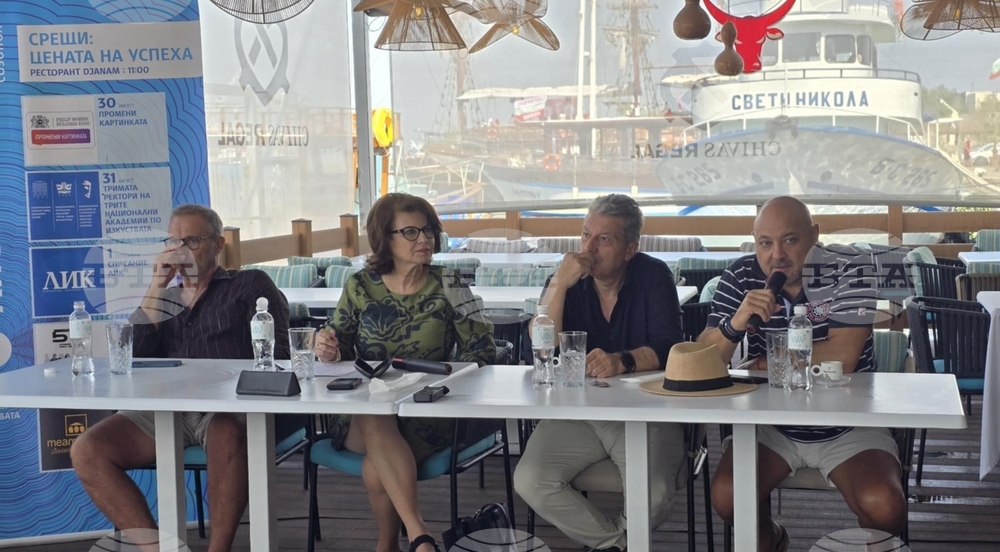site.btaRectors of Bulgaria’s Three National Art Academies Come Together at Apollonia Festival


The rectors of Bulgaria’s three national academies of the arts — Georgi Yankov of the National Academy of Art (NAA), Sava Dimitrov of the National Academy of Music (NAM), and Miroslav Dachev of the National Academy for Theatre and Film Arts (NATFA) — came together on Sunday as part of the “The Price of Success” series at the 41st Apollonia Festival of Arts in Sozopol.
Margarita Dimitrova, Executive Director of the Apollonia Arts Foundation, commented: “This is a gathering that has never happened before — me in the company of the three rectors of Bulgaria’s art academies. It happened because each of them had student performances during the festival. So naturally, we decided to hold this meeting — to talk about the challenges of education, especially within our art academies, and to reflect on the personal cost of their success.”
Georgi Yankov, the NAA Rector, said: “Our higher education system is a highly competitive environment. Of course, a major issue is the demographic crisis. Another challenge is that many universities have created faculties or departments in the arts, which, given the population decline, affects us all. But I’m pleased to say that applicants to our Academy have increased annually in recent years. Young people now realize that it’s not about graduating from just any university; it’s about gaining the right knowledge and education.”
According to NATFA Rector Miroslav Dachev, success has different dimensions: it can be fleeting and superficial, or long-term and institutional. In his words, those who want to pursue the arts choose to study at the art academies, not just anywhere. He sees this competition as healthy: “The key issue is that the state needs to create mechanisms that protect these academies — only then can they become stronger,” he said.
He added that the three academies hold a strong place in society and that success feels more tangible and more widely recognized when they stand united.
Sava Dimitrov, the NAM chief, said the cost of success is high because the effort involved is highly specialized. “We were never meant to be administrators. As you know, heads of higher education institutions are elected by their peers, members of the academic community. We pay the price of collective wisdom when we are chosen to lead these complex institutions.”
Prof. Dimitrov emphasized that no rector works alone; their success is shared with administrators, their teams, and all who believe in them.
Yankov highlighted low administrative pay as a serious issue due to the delegated budgeting model. “Salaries for administrative staff are very low relative to the work they do. This leads to high turnover, and we are constantly searching for ways to provide additional funding,” the professor explained.
“As if life weren’t insultingly short already, the salaries are insultingly low too — and yet we must find ways to manage. That’s what a leader is for,” said NATFA’s Rector.
Dimitrov stressed that all three rectors work hard to defend the cause of higher education in the arts. He believes this mission must involve partnerships with trade unions and the Ministry of Education and Science.
The NAA has had a branch in Burgas for seven years. At the invitation of Burgas Municipality, the NATFA and the NAM are also preparing to open satellite campuses in the city. The NATFA has already begun accepting applications.
The rectors expressed their support for Burgas’s bid to become European Capital of Culture in 2032. Margarita Dimitrova confirmed that the Apollonia Foundation also backs the initiative.
The Apollonia Festival of Arts has been held since 1984. It is organized by the Apollonia Foundation, established in 1991. Each year, the festival’s venues in Sozopol attract hundreds of artists and thousands of art lovers from Bulgaria and abroad. The event aims to preserve cultural traditions while also supporting emerging talent across various art forms. This year’s programme includes over 70 events spanning music, theatre, literature, cinema, and visual arts. The Bulgarian News Agency (BTA) is a media partner of the festival. On September 1, as part of the Apollonia Festival, the latest issue of LIK—BTA’s magazine dedicated to literature, art, and culture—will be presented. The August edition of the publication is dedicated to the 130th anniversary of the beginning of organized tourism in Bulgaria.
/VE/
Additional
news.modal.image.header
news.modal.image.text
news.modal.download.header
news.modal.download.text
news.modal.header
news.modal.text



